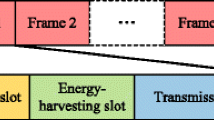Abstract
In cognitive radio (CR) network, to improve spectrum sensing performance to primary user (PU) and decrease energy wastage of secondary user (SU) in cooperative spectrum sensing, an energy harvesting-based weighed cooperative spectrum sensing is proposed in this paper. The SU harvests the radio frequency (RF) energy of the PU signal and then converts the RF energy into the electric energy to supply the power used for energy detection and cooperation. The time switching model and power splitting model are developed to realize the notion. In the time switching model, the SU performs either spectrum sensing or energy harvesting at any time, while in the power splitting model, the received PU signal is split into two signal streams, one for spectrum sensing and the other one for energy harvesting. A joint optimization problem is formulated to maximize the spectrum access probability of the SU by jointly optimizing sensing time, number of cooperative SUs and splitting factor. The simulation results have shown that compared to the traditional cooperative spectrum sensing, the proposed energy harvesting-based weighed cooperative spectrum sensing can decrease the energy wastage obviously while guaranteeing the maximum spectrum access probability.












Similar content being viewed by others
References
Mitola J (2001) Cognitive radio for flexible mobile multimedia communications. Mobile Netw Appl 6(5):435–441
Hamdaoui B (2009) Adaptive spectrum assessment for opportunistic access in cognitive radio networks. IEEE Trans Wirel Commun 8(2):922–930
Ghasemi A, Sousa ES (2008) Spectrum sensing in cognitive radio networks: requirements, challenges and design trade-offs. IEEE Commun Mag 46(4):32–39
Shen J, Liu S et al (2009) Robust energy detection in cognitive radio. IET Commun 3(6):1016–1023
Duan DL, Yang LQ, Principe JC (2010) Cooperative diversity of spectrum sensing for cognitive radio systems. IEEE Trans Signal Process 58(6):3218–3227
Liu X, Tan XZ (2011) Optimization for weighed cooperative spectrum sensing in cognitive radio network. Appl Comput Electromagn Soc J 26(10):800–814
Zhao N, Yu FR, Sun H, Nallanathan A (2012) An energy-efficient cooperative spectrum sensing scheme for cognitive radio networks. In: Proceedings of the IEEE Global Communications Conference. Anaheim, pp 3600–3604
Chau YA (2013) Energy-efficient cooperative spectrum sensing with relay switching based on decision variables for cognitive radio. In: Proceedings of the 16th international symposium on wireless personal multimedia communications. Atlantic, pp 1–6
Valenta CR, Durgin GD (2014) Harvesting wireless power: survey of energy-harvester conversion efficiency in far-field, wireless power transfer systems. IEEE Microw Mag 15(4):108– 120
Liu L, Zhang R, Chua KC (2012) Wireless information transfer with opportunistic energy harvesting. IEEE Trans Wirel Commun 12(1):288–300
Park S, Hong D (2013) Optimal spectrum access for energy harvesting cognitive radio networks. IEEE Trans Wirel Commun 12(12):6166–6179
Liu X (2014) A new sensing-throughput tradeoff scheme in cooperative multiband cognitive radio network. Int J Netw Manag 24(3):200–217
Stephen B, Neal P et al (2011) Distributed optimization and statistical learning via the alternating direction method of multipliers. Found Trends Mach Learn 3(1):1–122
Liu X, Jia M et al (2014) Optimal joint allocation of multislot spectrum sensing and transfer power in multichannel cognitive radio. J Sensors 2014:1–9
Huang X, Hu F, Wu J, Chen HH, Wang G, Jiang T (2015) Intelligent cooperative spectrum sensing via hierarchical dirichletprocess in cognitive radio networks. IEEE J Sel Areas Commun 33(5):771–787
Huang X, Wang G, Hu F (2013) Multitask spectrum sensing in cognitive radio networks via spatiotemporal data mining. IEEE Trans Veh Technol 62(2):809–823
Acknowledgments
This work was supported by the National Natural Science Foundations of China under Grant Nos. 61471194 and 61301131, the Natural Science Foundation of Jiangsu Province under Grant No. BK20140828, the Fundamental Research Funds for the Central Universities under Grant No. NS2015088, the Chinese Postdoctoral Science Foundation under Grant No. 2015M580425, the Scientific Research General Project of Liaoning Province Eduction Commission under Grant No. L2014204 and the Scientific Research Foundation for the Returned Overseas Chinese Scholars of State Education Ministry.
Author information
Authors and Affiliations
Corresponding author
Rights and permissions
About this article
Cite this article
Liu, X., Chen, K., Yan, J. et al. Optimal Energy Harvesting-based Weighed Cooperative Spectrum Sensing in Cognitive Radio Network. Mobile Netw Appl 21, 908–919 (2016). https://doi.org/10.1007/s11036-016-0711-y
Published:
Issue Date:
DOI: https://doi.org/10.1007/s11036-016-0711-y




